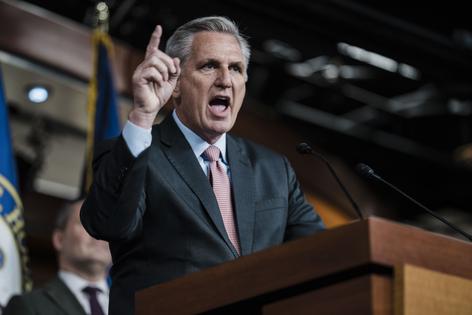In Congress, breaking unwritten rules that encouraged civility and enabled things to get done is becoming the new normal
Published in Political News
When House Speaker Kevin McCarthy ordered an investigation into the Manhattan district attorney’s ongoing criminal probe of former President Donald Trump, he broke with House practices and norms.
And the three committee chairmen McCarthy tasked with investigating may be stepping outside of federal jurisdiction by attempting to investigate a county prosecutor.
As a scholar of the legislative branch, I study how its practices and procedures have changed over time. This move is just one in a growing list of norm-breaking events that have colored how the House, during the 118th Congress, conducts business.
When McCarthy gave government-owned footage of the Jan. 6th insurrection to a single media outlet, he broke a long-standing congressional norm of releasing government information to media outlets broadly.
When multiple, unrepentent Republican representatives heckled Democratic President Joe Biden during his February 2023 State of the Union address, they broke behavioral norms for the occasion. The last person who heckled a sitting president during the State of the Union was Rep. Joe Wilson, of South Carolina, in 2009 when President Obama addressed a joint session of Congress. Wilson apologized.
Even before this session of Congress began in January 2023, Republicans members of the House broke a norm by forcing 15 ballots over four days before voting to make McCarthy speaker. The last Speaker vote that required multiple ballots was in 1923 when it took nine.
But when McCarthy denied seats on the House Intelligence Committee to Democratic Reps. Adam Schiff, who once chaired the committee, and Eric Swalwell, both of California, he went much further. Historically, both parties have tended to avoid politicizing national security. Removing members with the kind of institutional knowledge Schiff and Swalwell possess could have serious consequences for the effective operation of the committee.
The House also voted to remove Rep. Ilhan Omar, another Democrat, from the House’s Foreign Affairs Committee.
In the House, Republican and Democratic leadership are traditionally in control of which members they submit for committee assignments. Despite this norm, McCarthy refused to allow Schiff or Swalwell a seat on the Intelligence Committee after Minority Leader Hakeem Jeffries put their names forward.
Accusing Reps. Swalwell and Schiff of misusing the panel during the previous two Congresses, McCarthy said he was denying the two representatives seats on the committee for national security reasons. And he forced a floor vote to oust Omar for her antisemitic comments, even though she apologized.
House Democrats maintain McCarthy’s move was political payback because the House, under former Speaker Nancy Pelosi, a Democrat, had voted to remove Republican Reps. Marjorie Taylor Greene and Paul Gosar from their committees over incendiary comments the two made. Some of their remarks included threats of violence against members of the House.
That was not the first time Pelosi denied the Republican minority leader his choice of committee appointments. During the 117th Congress, when she and House Democratic leadership were populating the Jan. 6 committee to investigate the Capitol insurrection, McCarthy wanted to seat two known Trump loyalists: Reps. Jim Banks of Indiana and Jim Jordan of Ohio. Pelosi rejected them.
Traditionally, if a member of Congress committed an offense that did not rise to the level of an ethics investigation, their leadership would decide how to punish them. That was the case in 2019, when then-Minority Leader McCarthy stripped now former Iowa Rep. Steven King of his committee assignments, citing King’s racist comments.
But McCarthy did not punish Greene – Pelosi did.
At the time, Republicans warned Pelosi she was setting a precedent – or new norm – of the majority party in the House determining committee assignments for the minority party.
“If this is the new standard, I look forward to continuing out the standard,” McCarthy said.
The norms of governance in the House provide stability and clarity regarding what type of behavior is and is not allowed among members. But when those norms are broken, a series of devolving consequences can follow.
Republican members of Congress attacking Democrats and Democratic members of Congress attacking Republicans has long been a way for elected officials to grab voters’ attention. But the divisive rhetoric and deeply partisan behavior of officeholders over the past few decades has only pushed the two parties farther apart, particularly during the 2000s.
During that period, it became clear that politicians who whipped up their bases by using the politics of outrage could score political points and replenish their political coffers at the same time. That realization has changed the political calculus.
Today, donors reward shocking behavior. Sen. Josh Hawley, of Missouri, for example, raised US$3 million after he voted to block the presidential election results on Jan. 6, 2021.
Greene raised $3.2 million after only three months in office when news broke that she embraced conspiracy theories and previously threatened violence against Democratic politicians. Perhaps seeking similar results, when McCarthy kicked Schiff off the House Intelligence Committee, Schiff went on TikTok to announce his candidacy for the Senate.
Whether this extreme behavior by elected officials is motivated by political one-upmanship or money, or both, Americans are watching, and many don’t approve of the behavior. A February Gallup Poll has approval of Congress hovering around 18%.
This article is republished from The Conversation, an independent nonprofit news site dedicated to sharing ideas from academic experts. If you found it interesting, you could subscribe to our weekly newsletter.
Read more:
George Santos: why the Republicans aren’t doing anything about the controversial congressman, yet
The weaponization of the federal government has a long history
Sarah Burns receives funding from the Institute for Humane Studies and she is a non-resident fellow at The Quincy Institute.




























































Comments